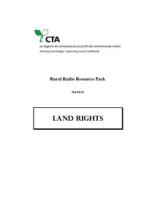Land Library Search
Through our robust search engine, you can search for any item of the over 73,000 highly curated resources in the Land Library.
If you would like to find an overview of what is possible, feel free to peruse the Search Guide.
/ library resources
Showing items 1 through 9 of 20.Arid shrub-lands in Syria and elsewhere in West Asia and North Africa are widely thought degraded. Characteristic of these areas is a preponderance of unpalatable shrubs or a lack of overall ground cover with a rise in the associated risks of soil erosion.
When a national park is created, the people who are forced to leave the area can increase the pressure on the surrounding communities. How can governments balance both the need for foreign exchange and environmental conservation, with the livelihood needs of the local people?
Dan Chirwa explaining to Patrick Mphaka how the water of Lake Malawi is a natural birthright for all Malawians.
Apart from the issue of fairness, there is also considerable evidence that giving people secure rights to their land and natural resources, helps to ensure that land is properly maintained and resources are responsibly exploited.
Catherine Gatundu describing how the Forest Action Network is helping communities in Kenya to stand up for their rights to clean, safe water.
Femba John of Babungo village in Cameroon explaining to Martha Chindong how a dispute over access has left the villagers with no clean water source.
Charles Batchelor explaining how the traditional Indian concept of water as a community resource has been replaced by a system of private wells, so restricting the access of poorer people to water.
This documents contains technical information related experiences of people who have struggled ? and sometimes failed - to keep their rights to their land. There are examples from Cameroon, Malawi, Zimbabwe and The Gambia.
If a woman loses her husband, she is also at risk, in many countries, of losing the land and property on which her survival depends. Prisca Ngum, a widow in Cameroon, describes her experience, and questions the tradition that widows should have no rights to their late husband?s property.



